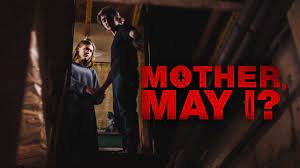Emmett's mother (Kyle Gallner) has passed away. He and his fiancée Anya (Holland Roden) claim her ashes and go to her house, the house she left Emmett, to clean it up and possibly sell it. Emmett doesn't seem to be mourning the loss of his mother, perhaps because he still has a lot of anger that she abandoned him at a young age.
In an effort to relax him, Anya suggests they eat mushrooms, after which things take a turn when Anya starts acting like her mother. Her gestures change, also her voice and appearance, even her handwriting. Anya is always dressed, her face barely made up, usually messy, and now she is the complete opposite.
Director: Laurence Vannicelli
Writer: Laurence Vannicelli
Stars: Daphne Gaines, Kyle Gallner, Michael Giannone
Her face is expertly made up as she drives to buy a rotisserie chicken, and she's making bacon and eggs for Emmett when Anya barely cooks. Emmett, as expected, is freaking out. He can't figure out if this is a game Anya conjured up to psychoanalyze him, or if she really has been possessed by the ghost of her mother.
The movie is mostly two-handed, which is perfectly fine since Gallner and Roden are more than up for the task. They are fantastic together, commanding the screen with their natural chemistry and acting talent. Roden is able to transform his physique and her behavior when he plays Emmett's mother. Later in the movie, we hear her mother's voice as Emmett watches some old videos of them together, and it's weird how alike they sound.
Gallner may be one of the most underrated actors working today. He's amazing at everything he does, and it's fascinating to watch him take on this role. He develops Emmett's complicated feelings regarding the loss of his mother, as well as his navigation through this strange terrain of his fiancée posing as his mother.
Mother, can I? He has an amazing sense of atmosphere. The film is superbly well lit, with warm yellow candlelight at night and natural light during the day. The crossing fades into the immobile landscape and the inhabitants of the house convey a sense of dislocation and loneliness. Both Emmett and Anya are very distant from everyone, but they are also distant from each other.
Anya often has Emmett play a role reversal game, one of the tricks Anya learned from her psychoanalyst mother, that allows each person to immerse themselves in the other's perspective and speak truths that the other doesn't feel. comfortable revealing. These couch sessions always end badly, with Emmett refusing to share his problems, while Anya tries to bully him into submission. The tension builds with each piece of the chair inversion game, too, and it's fascinating to watch each session unfold.
According to Freud, children at an early age look to their mother as a primary focus of desire. They usually move past this phase and go on to have healthy romantic relationships. But if they can't get past this phase, the parental fixation remains, which seems to be the case with Emmett, who has never been able to let go of his mother despite her anger at him for abandoning him. As Emmett and Anya play out the dynamics of her relationship, he feels that he chose her because she cares for him, while Anya feels a sense of control in her relationship by playing that role.
While things meander a bit after the climax, and the film at its conclusion isn't nearly as engaging as its previous two-thirds, Mother May I? it's a fascinating watch and has a lot to say about the complex relationships we have with our mothers.

Comments
Post a Comment